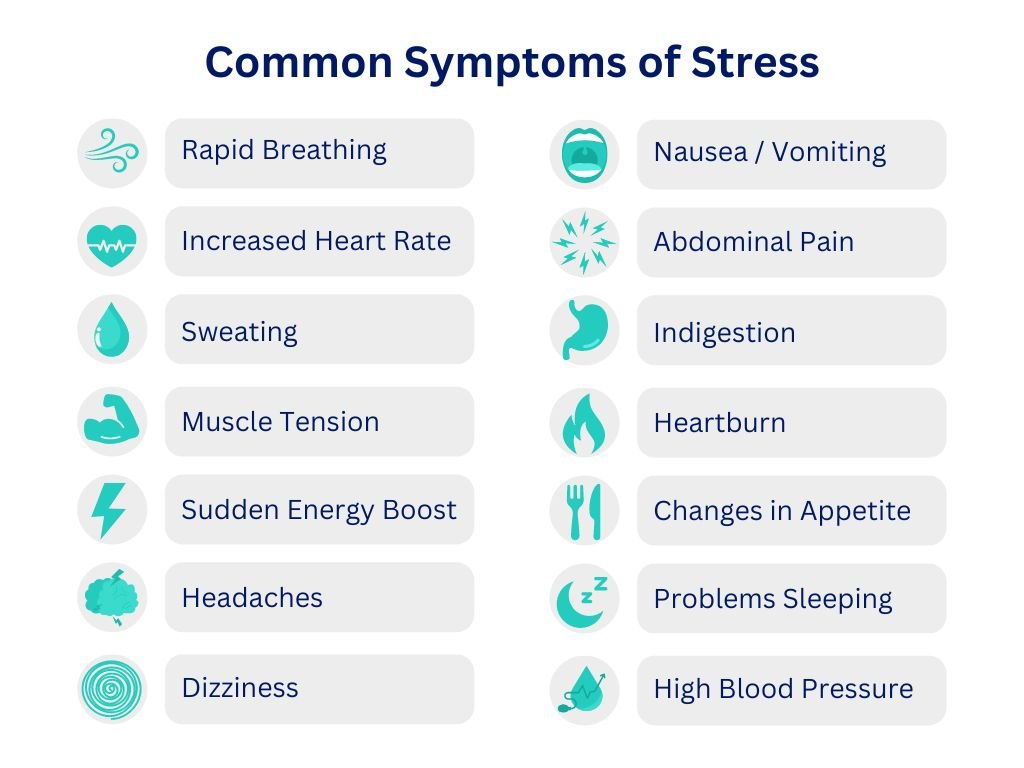Health & Wellbeing
Are you Stressed? Causes, Symptoms, and How to Fix it
June 15, 2024

What Is Stress, and Why should I Avoid it?
Stress is our body's natural reaction to challenging situations where we feel under pressure, or feel we have a lack of control. It can result in various physical, emotional, and behavioural reactions. Although it is a natural response, chronic stress can have a negative impact on your overall health, increasing your chances of experiencing anxiety and depression, and physical health issues such as heart disease, heart attacks, and strokes. If you find yourself stressed regularly or have times of extreme stress, it is important to review your lifestyle and take steps to reduce your stress levels. This article will help you to understand what stress is and suggest activities that you can implement to feel calmer and avoid the negative health effects of long-term stress.
Why Does Stress Happen?
Stress is caused by your body activating its emergency ‘fight, flight, or freeze’ response. The amount of stress hormones in your body increases so that they can be released to help you survive in times of pressure or danger. These hormones are called adrenaline, noradrenaline, and cortisol. In our early evolution, stress was caused by us facing life-or-death situations. Today, common stressful situations include facing big changes in your life, having overwhelming responsibilities, going through periods of uncertainty, and not having control of a situation. Stress can come from any area of your life: your work or study, your friends or family, your living situation, your finances, or your personal life. Everyone will experience different levels of stress in different situations, depending on your past experiences, the support you have around you, the resources (eg. time and money) that you have, and what else you’re going through.
Am I Stressed?
Stress can cause a range of mental and physical symptoms. Some of the most common symptoms of stress include:

Solutions to Manage Your Stress
Each person’s approach to managing their stress will be different depending on their lifestyle, preferences, and the cause of their stress. Look through our top tips below and experiment with which ones work best for you. You may find it helpful to mix and match and try a few of these at once.
Get Support
It’s important to reach out for support when you feel stressed. This could be from a friend, family member, partner, GP, counsellor, or community leader. They can relieve your mental burdens by listening to your concerns and relieve your physical burdens by organising help for tasks you find stressful or overwhelming.
Relax Your Mind and Body
Meditation and breathing exercises are great for calming you down and helping you focus on the present. One popular breathing exercise is box breathing. This method of taking slow, deep breaths can decrease your stress and increase your concentration. For more information, watch this box breathing tutorial from Anxiety NZ.
Meditation can reduce the effects of stress and anxiety and make you feel at peace. The process of meditating helps you quiet your thoughts by focusing your attention. There are many free meditation resources available online, such as the Smiling Mind app. If you enjoy being active, techniques such as Yoga and Tai Chi are ways to meditate and exercise at the same time.
Stretching regularly is another great way to relax your body and relieve muscle tension. You could also try progressive relaxation, which involves tensing and relaxing different muscles throughout your body.
Our Recommended Products for Stretching:
Exercise
Exercise has a wide range of stress-relieving benefits. It can give you feel-good endorphins, reduce your stress hormones, improve your mood and increase your confidence. Focusing on the movement of your body can give you a break from any stressful thoughts. Light physical exercise such as working in the garden or going to the shops can help reduce stress. Spending 20 minutes in nature can significantly lower your levels of the stress hormone cortisol. Ideally, your target should be 150 minutes of moderate-intensity exercise per week – for example, brisk walking – but don’t be disheartened if you don’t reach this.
Get Some Sleep
It’s common to have trouble sleeping when you’re stressed. A good night’s sleep will help to lower your stress levels because a lack of sleep will increase your levels of the stress hormone cortisol. Try to stick to a regular sleep schedule of between 7-9 hours and aim to go to sleep and wake up at the same time each day.
Live in the Present
- Spend time doing your favourite hobby
- Listen to soothing music
- Get lost in a book
- Sit down with a cup of calming caffeine-free green or chamomile tea
- Cuddle a pet
Write Down Your Thoughts
Spend a few minutes each day writing down any negative feelings and what things have caused you stress. This will help relieve the emotions you’re feeling. Over time, reviewing your notes can help you understand what things cause you the most stress, and you can then make plans to avoid or minimise these things in the future. For example, it might be helpful to hand tasks over to someone else, do things in a more leisurely way, or choose a few things to prioritise instead of doing everything at once.
Avoid Unhealthy Habits
When we are stressed, it is easy to reach for familiar vices that provide comfort. Reducing your intake of substances such as caffeine and alcohol and cutting down on smoking will have a positive long-term impact on your physical and mental health.
Plan Your Time
Short-term stress is often caused by many little things going wrong, such as running late, being stuck in traffic or forgetting where you put something. Plan your day with some wriggle room in case the unexpected happens and try preparing for the day the night before. Small actions like laying out the next day’s clothes and having your meals prepared can help you feel calmer and will save you time.
Tidy Up
A messy home or work area can sometimes reflect the chaos you are feeling internally. Decluttering can help you focus and feel more peaceful in your surroundings.
Laugh!
Laughter changes your body in a positive way. When you laugh, your mental load and overall stress level decrease. When you’re feeling stressed, try watching your favourite comedy show or movie or spending time with someone that always makes you laugh.
More related articles

The common causes of hair loss and how to treat them
Hair loss can be an embarrassing issue for both males and females. Research has shown that hair loss can have more than a physical impact and affect people psychologically, resulting in low self-esteem, depression and feelings of unattractiveness.

